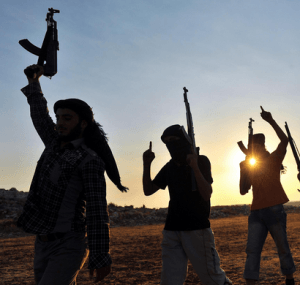West Africa needs robust security infrastructure to stamp-out violence extremism
 Security experts at a forum on vulnerabilities and resilience in peace infrastructure in West Africa have advocated for a robust security infrastructure among the West African States to stamp-out the emerging threats of violence extremism, and terrorism.
Security experts at a forum on vulnerabilities and resilience in peace infrastructure in West Africa have advocated for a robust security infrastructure among the West African States to stamp-out the emerging threats of violence extremism, and terrorism.
According to them, infrastructure for peace was a relatively new phenomenon in peace and conflict studies but had, however, received much acceptance in the United Nations circles and was seen to have great potential for conflict prevention, management, and resolution.
That they indicated were necessary for rapid socio-economic transformation.
The security stalwarts are Professor Kwesi Aning, Director of the Faculty of Academic Affairs and Research at the Kofi Annan International Peacekeeping Training Centre (KAIPC), and Major General Francis Ofori, Commandant, KAIPC and Mr Matthew Eghan, Chairman, Central Regional Peace Council.
They made the call in separate speeches delivered at the opening of a three-day workshop on, “vulnerabilities and resilience in peace infrastructure in West Africa” in Cape Coast on Tuesday.
The engagement was arranged by KAIPC in collaboration with the National Peace Council (NPC) and supported by the Ministry of Foreign Affairs of Denmark.
Violent extremism, they noted threatened the peace and stability of West African countries with protracted conflicts and violence, not to mention the heartless killings, displacement of people, and destruction of property, which eventually exacerbated the tension.
Professor Aning stressed the urgent need for the priotisation of sustainable means of financing for security infrastructure to curtail the challenges associated with it for a sustained development.
He also stressed the need for countries to prioritize and improve the core governance functions, institutions and as well deepen the collaborative capabilities for peace for improved outcomes.
“The rhetoric about African solutions to African problems is good, but we lack the capacity and the political will to move with the speed to swiftly respond to challenges,” he indicated.
Major General Ofori, said there was no doubt that creating the necessary national structures was an important first step towards effective conflict prevention.
“We often wait too long for violence conflicts to erupt before attempting to respond and this has proven to be costly and detrimental in both human and material terms.
“It is, therefore, incumbent upon us all to play our part in this process if we are to achieve the objective of building national institutions, resources, and skills to resolve conflicts and sustain peace within our societies,” he added.
For his part, Mr Eghanl, stated that most African States lacked capacities to manage and respond to fragility as their conflict prevention institutions were either weak or non existence
He stated that in resilient societies, capacities were fostered for greater social and political cohesion to address the structural causes of fragility.
Infrastructure for peace, according to him, was geared towards developing a mechanism for cooperation among all relevant stakeholders in peace building to promote cooperative problem solving to conflicts and to institutionalize response mechanisms.
Infrastructure for peace should not mean a grid structure but a process that leads to sustainable peace, Mr Eghan said, adding that, “the national, district, and local Peace Councils are the cornerstones of such structure”.
“A peace infrastructure should be a platform that is responsive to day-to-day issues that arise in the ebb and flow of conflict, while it sustains a clear vision of change and in the longer term, to sustain development,”
Source: GNA
